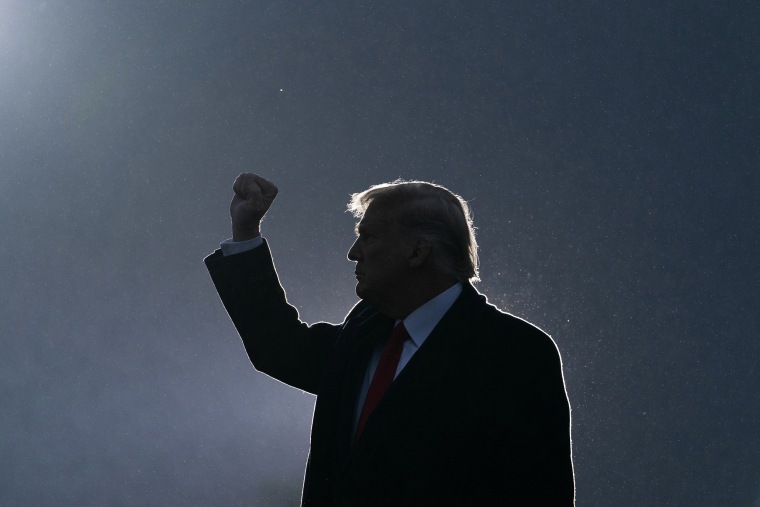While the votes are still being counted, NBC News projected Saturday that former Vice President Joe Biden had defeated President Donald Trump.
The last time an incumbent president was defeated was 28 years ago, when Arkansas Gov. Bill Clinton beat President George H.W. Bush. But changes in party control are far more common, including Clinton's handover to George W. Bush in early 2001, when Bush staffers complained about acts of vandalism in the West Wing (and missing "W" keys on their keyboards). Barack Obama's handover of power to Donald Trump is one of the more dramatic recent examples.
The last time an incumbent president was defeated was 28 years ago, when Arkansas Gov. Bill Clinton beat President George H.W. Bush.
No matter who is taking over the presidency, the so-called lame-duck period between the election and the inauguration of a new president on Jan. 20 can be difficult, especially in times of national crisis. (And before the 20th Amendment, ratified in 1933, it lasted for five months!) President-elect Biden will take over a country facing myriad challenges. And Trump's lame-duck period could be one of the most treacherous in American history.
History provides plenty of context. Sitting presidents may be tempted to try to lock in decisions that their successors dislike, like President John Adams' appointing dozens of last-minute judges in early 1801 before Thomas Jefferson became president. Or the two transition teams may simply find it difficult to cooperate in the handover process. Sometimes, however, what a lame-duck president doesn't do can be just as important — and perhaps even more dangerous.
Take the example of President James Buchanan. Elected in 1856, as the country slid further into sectional disputes, Buchanan ran an administration dedicated largely to preserving Southern priorities: His inaugural address stated that the country should accept the results of the forthcoming Supreme Court decision in Dred Scott v. Sandford, which (at his behest) would eviscerate the Missouri Compromise and declare that Blacks could not be citizens of the United States; he favored those trying to bring slavery to Kansas and ignored violence against those preferring that it to be a free state; and, most disastrously, he did virtually nothing as the country plunged into civil war.
Want more articles like this? Follow THINK on Instagram to get updates on the week's most important political analysis
After Abraham Lincoln's election victory in November 1860, Buchanan remained passive as the Southern states gradually seceded, barely lifting a finger to complain or encourage them to remain in the Union. Buchanan even argued that he had no constitutional authority to compel states to stay. Worse yet, he allowed the South to take possession of forts and armaments it would use in the battles to come. As a result of Buchanan's inaction, Lincoln entered office in a terribly perilous situation, with Army officers at Fort Sumter, South Carolina, on the verge of starvation. A few months later, Lincoln's attempt to resupply the fort led to the opening shots of the war.
Like Buchanan, President Herbert Hoover remained seemingly paralyzed during his lame-duck period, after his loss to Franklin D. Roosevelt in November 1932. As the country sank deeper into the Great Depression, the banking system was on the verge of complete collapse, with bank failures multiplying by the day. Hoover, in the grip of his ideological objections to federal assistance, refused to intervene, even as the Federal Reserve begged him to declare a bank holiday. Hoover repeatedly maintained that the economy would begin to recover at any moment: "The Depression is over," he told people.
Hoover also tried to manipulate Roosevelt into declaring that he would maintain the economic policy status quo upon taking office, including the gold standard and fiscal austerity, as well as the creation of no major public works projects. Hoover blamed the deepening economic crisis on FDR, claiming that Roosevelt's profligate spending proposals were rattling the markets and undermining economic confidence. Roosevelt largely ignored Hoover's demands, however, and made his own plans for rapid action upon taking office, including a bank holiday imposed by executive order on his third day as president.
With the Covid-19 virus still spreading rapidly across the country, Trump's repeated insistence that we are "turning the corner" is eerily reminiscent of Hoover's asserting that the Depression was about to end, and it's entirely possible that Trump will, like Hoover, try to bully the incoming administration into a series of irreversible decisions.
Or perhaps, like Buchanan, Trump will simply claim that he doesn't have the authority to impose national mandates on the states and will remain passive in the face of the increasing danger. He could also encourage the rise of violent "militias" that refuse to accept the outcome of the election by continuing to spread misinformation that it being "stolen" from him.
At best, the transition process will undoubtedly be a contentious one (as was the Obama-Trump handover four years ago), especially if Trump continues to falsely claim that Biden's victory is tainted by fraud.
Related:

